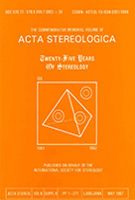Explanation of apparent paradoxes in Cavalieri sampling
Department of Mathematics, Statistics and Computation, Faculty of Sciences, University of Cantabria, E-39005 Santander
Department of Mathematics, Statistics and Computation, Faculty of Sciences, University of Cantabria, E-39005 Santander
Abstract
To predict the precision of systematic sampling in design stereology is an old problem. In G. Matheron’s transitive theory the variance is decomposed into the extension term, which represents the trend and it can be estimated from data, a “Zitterbewegung” term, which is neglected because it oscillates about zero, and higher order terms which are ignored. Recently, K. Kiêu and coworkers have established a precise connection between the extension term and the smoothness properties of the measurement function (e.g. the ‘area function’ when estimating a volume from Cavalieri sections), and completing the Zitterbewegung term. The extension term is always a good approximation of the variance when the number of sections is very large, but not necessarily when this number is small. In this paper we propose a more general representation of the variance and we construct a flexible extension term which approximates the variance satisfactorily for an arbitrary number of sections.

